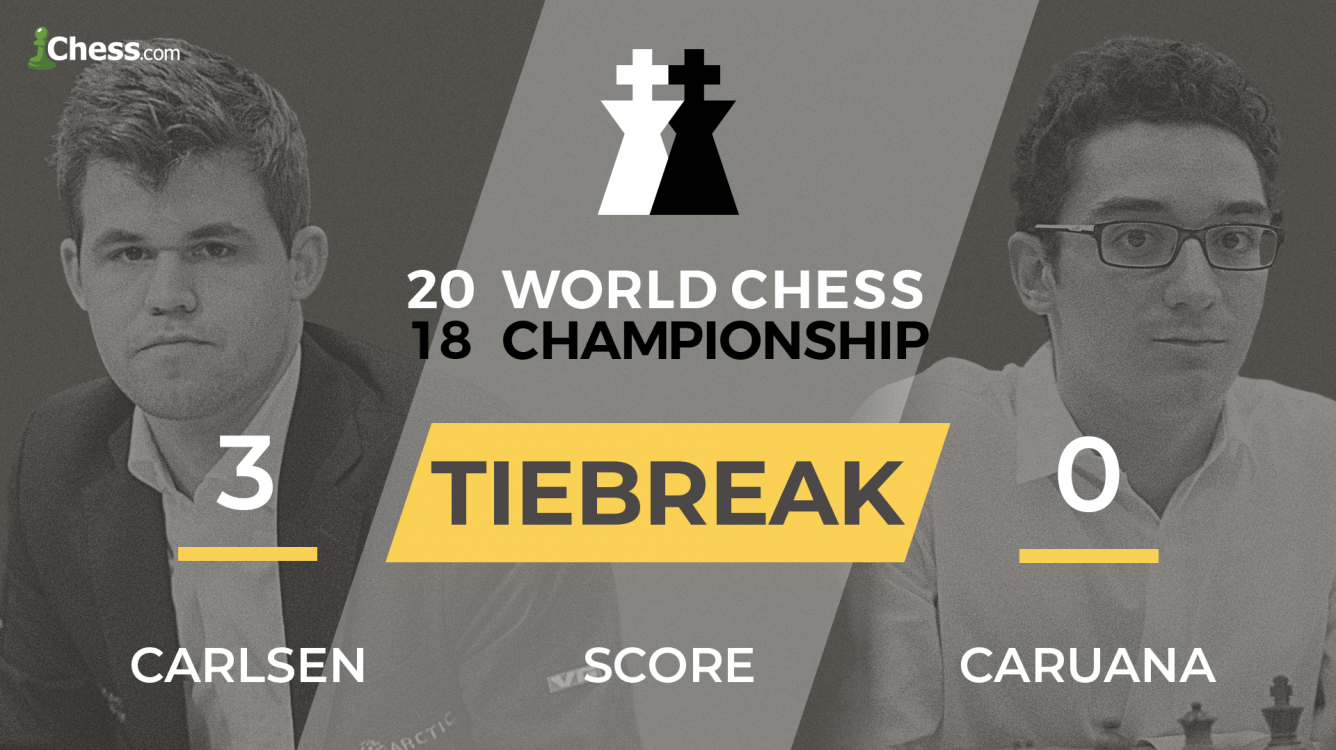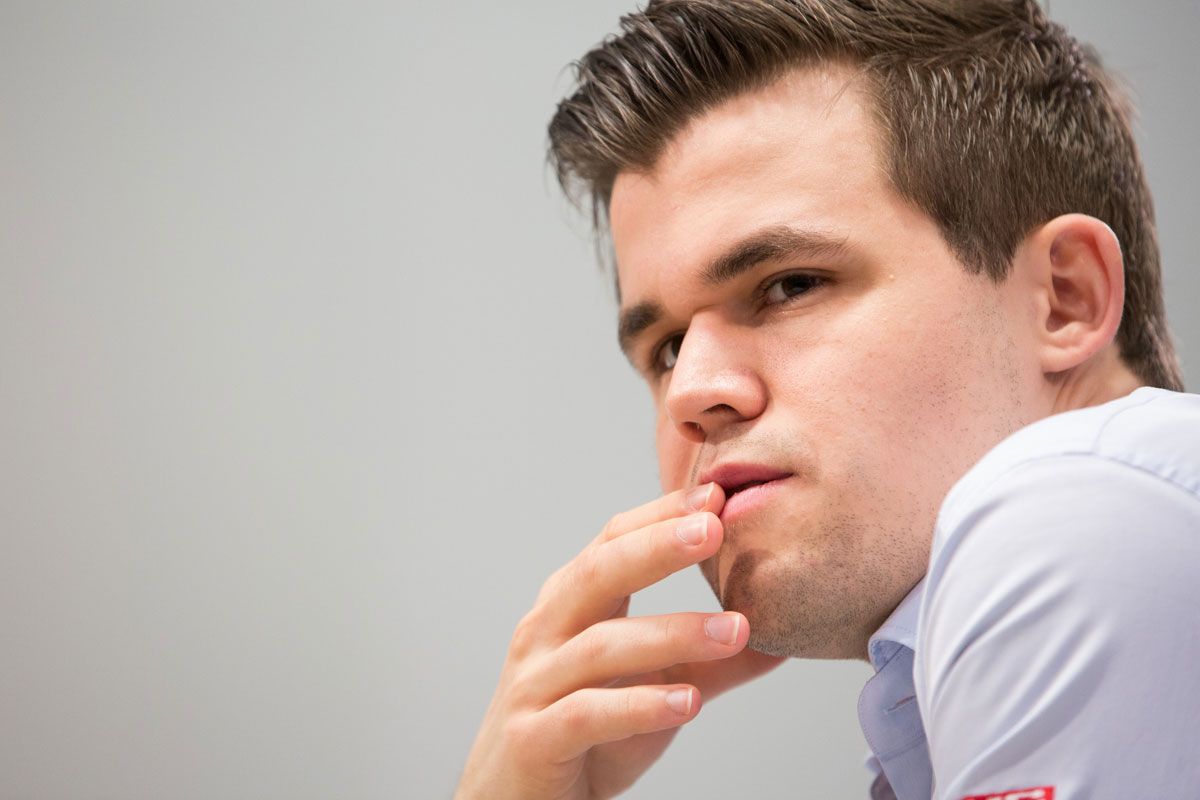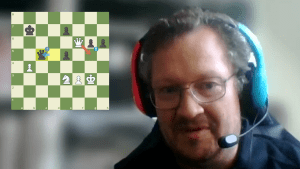
World Chess Championship 2018: Carlsen vs Caruana
Magnus Carlsen defeated Fabiano Caruana in game three of the rapid playoff to clinch the 2018 world chess championship. After 12 draws in the classical games, Carlsen won all the games of the tiebreak to win 3.0-0.0.
He has now successfully defended his title for the third time.
In the third and final playoff game, Caruana tried a new opening: the Kan Sicilian. Carlsen went for a Maroczy Bind structure. The challenger, who needed a win, couldn't create much counterplay. The knight-for-bishop ending prolonged the game, but ultimately Carlsen got the better chances and the faster pawns.
As he often does, Carlsen didn't settle for a clinching draw, and instead played on for a win. For the first time since winning the title in 2013, Carlsen won the championship without losing a single game of any kind.
The game lasted 51 moves and a full report will come later today. Here's GM Sam Shankland's analysis of the clinching game:
Game Two: Carlsen also won game two of the 2018 world chess championship playoff against Fabiano Caruana. He now has a commanding 2.0-0.0 lead heading into game three. The champion only needs a half-point from the final two games to retain his title.
In game two, Carlsen entered yet another Sveshnikov. Like in the final classical game, he routed his knight to e7 and g6.
The action really got going when Caruana pushed through his c-pawn. Carlsen calmly let it advance, then snatched it one square before promotion. Although he technically played a piece sacrifice, the Norwegian had too many light squares to invade and White's position was too uncoordinated to save.
The game lasted just 28 moves. Here's GM Sam Shankland's analysis:
If Caruana somehow wins the next two games, then a pair of blitz games at 5+3 will occur. If no winner after the first blitz match, four more pairs of blitz games. The two would have to tie after five pairs of blitz games (10 total blitz games) before an Armageddon game would be played.
Game One: Carlsen won the first game of the rapid playoff in 55 moves. The opening, in which Carlsen was White, was nearly a reverse Sveshnikov, an opening already featured several times in the classical with opposite colors.
Carlsen offered a pawn for long-term play on the queenside. He isolated nearly all of the challenger's pawns. Carlen also obtained the bishop pair in the process and won a complicated rook ending.
Here's GM Sam Shankland's analysis:
The rapid games took place at a time control of 25+10. Game four was not needed since Caruana's deficit was insurmountable.
The world championship match between Magnus Carlsen and Fabiano Caruana is underway in London. Here’s all the information:
Results
Game 1: Caruana vs. Carlsen (0.5-0.5)
![]() Caruana Struggles But Holds Draw Against Carlsen
Caruana Struggles But Holds Draw Against Carlsen
(Game annotated by GM Sam Shankland)
Game 2: Carlsen vs. Caruana (0.5-0.5)
![]() Carlsen 'Grovels' To Draw After Caruana's Opening Surprise
Carlsen 'Grovels' To Draw After Caruana's Opening Surprise
(Game annotated by GM Sam Shankland)
Game 3: Caruana vs. Carlsen (0.5-0.5)
![]() Caruana Repeats Rossolimo But Can't Break Carlsen
Caruana Repeats Rossolimo But Can't Break Carlsen
(Game annotated by GM Sam Shankland)
Game 4: Carlsen vs Caruana (0.5-0.5)
![]() Draw Again Despite Release Of Caruana's Training Notes
Draw Again Despite Release Of Caruana's Training Notes
Game 5: Caruana vs Carlsen (0.5-0.5)
![]() Caruana's Surprise Gambit Still Not Enough To Break Impasse
Caruana's Surprise Gambit Still Not Enough To Break Impasse
Game 6: Carlsen vs Caruana (0.5-0.5)
![]() Caruana Misses 'Impossible' Win
Caruana Misses 'Impossible' Win
Game 7: Carlsen vs Caruana (0.5-0.5)
![]() Another Queen's Gambit, Another Draw Carlsen Dodges Bullet In Sicilian
Another Queen's Gambit, Another Draw Carlsen Dodges Bullet In Sicilian
(Game annotated by GM Sam Shankland)
Game 8: Caruana vs Carlsen (0.5-0.5)
![]() Carlsen Dodges Bullet In Sicilian
Carlsen Dodges Bullet In Sicilian
Game 9: Carlsen vs Caruana (0.5-0.5)
Game 10: Caruana vs Carlsen (0.5-0.5)
Game 11: Carlsen vs Caruana (0.5-0.5)
![]() Good Prep Gets Caruana Easy Draw In Petroff Carlsen Offers Draw In Better Position To Reach Tiebreaks
Good Prep Gets Caruana Easy Draw In Petroff Carlsen Offers Draw In Better Position To Reach Tiebreaks
Game 12: Caruana vs Carlsen (0.5-0.5)
![]() Carlsen Offers Draw In Better Position To Reach Tiebreaks
Carlsen Offers Draw In Better Position To Reach Tiebreaks
Tiebreaks: Carlsen 3, Caruana 0
Watch on Chess.com
Dates
The championship takes place November 8-28, 2018 with the opening ceremony on the 8th, then two games, then a rest day, then two more games, then a rest day, and so on. Rounds will be at 3:00 p.m. London time. The closing ceremony (and tiebreak, if needed) is on the 28th.
Schedule
| Day | Date | Activity |
| Thursday | November 8 | Press conference & Opening Ceremony |
| Friday | November 9 | Game 1 (all games start at 3 p.m. GMT) |
| Saturday | November 10 | Game 2 |
| Sunday | November 11 | - |
| Monday | November 12 | Game 3 |
| Tuesday | November 13 | Game 4 |
| Wednesday | November 14 | - |
| Thursday | November 15 | Game 5 |
| Friday | November 16 | Game 6 |
| Saturday | November 17 | - |
| Sunday | November 18 | Game 7 |
| Monday | November 19 | Game 8 |
| Tuesday | November 20 | - |
| Wednesday | November 21 | Game 9 |
| Thursday | November 22 | Game 10 |
| Friday | November 23 | - |
| Saturday | November 24 | Game 11 |
| Sunday | November 25 | - |
| Monday | November 26 | Game 12 |
| Tuesday | November 27 | - |
| Wednesday | November 28 | Tiebreaks/Closing Ceremony |
Location
The venue for the match will be The College in Holborn, London. In a live stream on Facebook on August 2, World Chess director Ilya Merenzon noted that the building used to be part of Central Saint Martins college, a renowned arts and design school where, for instance, Stella McCartney graduated.
The building has a capacity of about 400-500 people per day, but the press release speaks of a capacity of 400.
The building has a theater, which will be used as the actual playing hall.
Some renders of the venue for the World Chess Championship Match. pic.twitter.com/TOk4ISAtXI
— merenzon (@merenzon) August 1, 2018
The location of The College (more info here) is central London. It's on Southampton Row, just north of the Holborn Underground station, and a short distance from the British Museum.
Players
This is a match between the top two players in the world in terms of FIDE Elo rating: Carlsen is world number one, and Caruana world number two. This is rare; the last time the world championship was a battle between the highest ranked chess players was in 1990 between Garry Kasparov and Anatoly Karpov.
Magnus Carlsen (Norway) is the reigning world champion, who will be defending his title. He is 27 years old, and has held the title since 2013, when he defeated then world champion Viswanathan Anand of India.
Carlsen is known as one of the biggest chess talents that ever lived. He became a grandmaster at the age of 13 years, 4 months and 27 days. He has won numerous tournaments and has been the world number one player continuously since 2011.

Magnus Carlsen. | Photo: Maria Emelianova/Chess.com.
Fabiano Caruana (USA) has earned the right to challenge the world champion by winning the FIDE Candidates' Tournament, in March of this year in Berlin. He is 26 years old and a former chess prodigy as well; he earned the grandmaster title when he was 14 years, 11 months and 20 days.
Caruana was born in Miami, grew up in Brooklyn but moved to Italy in 2005. He represented that country until 2015, when he returned to the USA. He lives in St. Louis, Missouri—the city where he won the 2014 Sinquefield Cup after starting with a historic seven straight wins.

Fabiano Caruana. | Photo: Maria Emelianova/Chess.com.
Prize fund
FIDE demands that the prize fund of the match should be a minimum of one million euros, net of any applicable taxes. Organizer World Chess reportedly provided not more than the minimum amount, except for part of the ticket revenue.
The prize fund will be divided 60 percent to the winner and 40 percent to the loser if the match ends within the 12 regular games. In case the winner is decided by tie-break games, the winner will receive 55 percent and the loser 45 percent.
Live games
Chess.com will relay the games at Chess.com/wcc2018 and provide a live video broadcast at Chess.com/TV and Twitch.tv/chess, where a team of chess masters will bring you the latest insights, instructive explanation of the moves, interviews, behind the scenes and more.
After each game, you will find detailed news reports by our authors @MikeKlein, @PeterDoggers and our photographer Maria Emelianova (@misslovalova), who will all be in London to provide on-site coverage each day.
Venue
Tickets for entering The College in Holborn, London are on sale at Ticketmaster. Prices range from 45 pounds ($58.85 / 50.63 euros) to 100 pounds ($130.73 / 112.47 euros).
Regulations
The official regulations can be found in PDF here. These are most important things to know:
- The match will be played over 12 games. When someone reaches 6.5 points, he wins.
- At the opening ceremony, a drawing of colors determines who will start with the white pieces.
- After six games, the colors are reversed, so whoever has white in game six, also has white in game seven. The other player will have white in both the first and the 12th game.
- The time control is 100 minutes for the first 40 moves, 50 minutes for the next 20 moves and then 15 minutes for the rest of the game plus an additional 30 seconds per move starting from move 1.
- If the scores are level after the regular 12 games, four tie-break games will be played. These are rapid games with 25 minutes for each player with an increment of 10 seconds after each move.
- If it's still equal, two blitz games will be played (5 minutes plus 3 seconds increment). If it's still equal, a second pair of two blitz games will be played. If there is still no winner after five such matches, one sudden-death game will be played. The player who wins the drawing of lots may choose the color. The player with the white pieces shall receive 5 minutes, the player with the black pieces shall receive 4 minutes whereupon, after the 60th move, both players shall receive an increment of 3 seconds starting from move 61. In case of a draw the player with the black pieces is declared the winner.
- The players cannot draw a game by agreement before Black's 30th move. A claim for a
draw before Black's 30th move is permitted only through one of the arbiters in
the cases of a threefold repetition.
History
The world championship of chess has a long tradition. The first official match was held in 1886 between Johannes Zukertort and Wilhelm Steinitz. The latter won, and became the first official world chess champion in history.
Emanuel Lasker (Germany), José Capablanca (Cuba), Alexander Alekhine (Russia/France) and Max Euwe (Netherlands) subsequently took the titles by beating the reigning champions in a match.
Alekhine won back the title but due to his death in 1946, it became vacant. FIDE organized a tournament in 1948 which was won by Mikhail Botvinnik (Soviet Union), who then lost his title but successfully won it back in matches against compatriots Vasily Smyslov and Mikhail Tal. After losing to Tigran Petrosian, Botvinnik lost the right for an automatic return match and stopped participating in the world championship cycle.
Boris Spassky was the one beating Petrosian, but with him the Soviet hegemony ended as Bobby Fischer (USA) famously won the Match of the Century in 1972 in Reykjavik. Because FIDE didn't accept all of Fischer's demands for a match with Anatoly Karpov in 1975, Fischer refused to play and forfeited his title. Karpov was declared world champion.
The Russian GM remained world champion for 10 years, when he lost his second match to Garry Kasparov in 1985 after the first had been terminated a year earlier by FIDE when there was still no decision after 48(!) games.
Kasparov won three more matches with Karpov but then stepped away from FIDE and played three matches under the newly founded Professional Chess Association (PCA). He defeated Nigel Short and Vishy Anand, but lost to Vladimir Kramnik in 2000, who thus is considered to be the 14th classical world champion.
Anatoly Karpov, Alexander Khalifman, Vishy Anand, Ruslan Ponomariov, Rustam Kasimdzhanov and Veselin Topalov won world titles in official FIDE events in the 1990s and 2000s, but these titles have been disputed because e.g. Kasparov and Kramnik did not participate, and they didn't follow the tradition of one-to-one matches.
Meanwhile, Kramnik defended his title in 2004 against Peter Leko and then won a "reunification match" against Topalov in 2006. Anand took over the title from Kramnik in a tournament in 2007 in Mexico, and subsequently defended it successfully in matches against Kramnik in 2008, Topalov in 2010 and Boris Gelfand in 2012.
Magnus Carlsen defeated Anand in 2013 in Chennai, and successfully defended his title against the same opponent in 2014, and against Sergey Karjakin in 2016. His third match opponent will be Fabiano Caruana, in November 2018.






